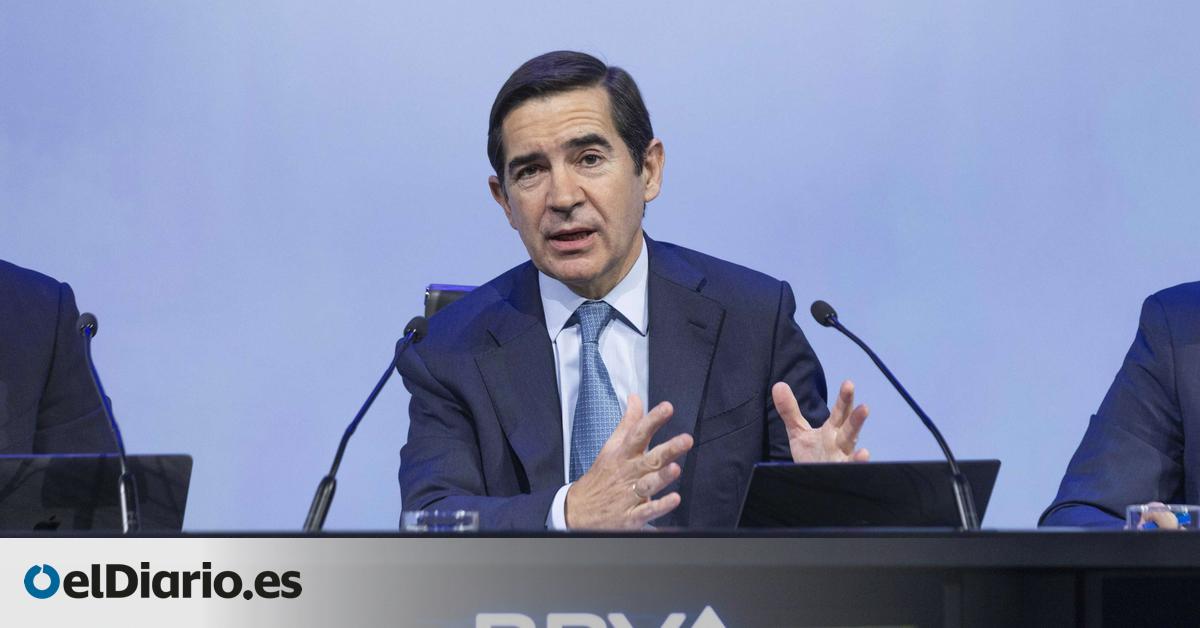
This Thursday, BBVA took an unprecedented step in Spain in almost four decades: it launched a hostile takeover bid for a competitor, Banco Sabadell. The last time a financial institution launched itself into a rival without the approval of the competitor in question was in 1987. Then, Banco de Bilbao – one of the branches that led to BBVA – tried to buy Banco Español of Credit, Banesto, the same one that ended up being chaired by Mario Conde and intervened only five years later.
Now, in mid-2024, BBVA wants to take control of Sabadell. At first, it has almost unanimous rejection. Neither the Sabadell management – which this Thursday accused BBVA of violating the takeover rule – nor Moncloa, nor the PP, nor some of the main regional employers’ associations, nor the unions support this corporate movement.
The bank chaired by Carlos Torres assures that it does have the initial approval of the European Central Bank (ECB) and key investors, who can allow the operation, at least in its early stages, to have a run. However, today, it does not seem easy to carry out the merger, which would result in almost two-thirds of all the assets and deposits of Spanish banking being in the hands of three entities: the merged one, Santander and Caixabank.
Majority rejection, but BBVA believes it will change opinions
BBVA has tried with Sabadell twice for good and both times have gone wrong. One in 2020, in the middle of a pandemic; the other, these last two weeks. He has tried to convince the board of directors of an agreed merger, giving BBVA shares to Sabadell investors and valuing the latter company at around 12,000 million euros. In that merger, the baton would be for the company led by Carlos Torres: the headquarters would be in Bilbao, the brand would be that of BBVA and Sabadell shareholders would have 16% of the new entity. The bank of Catalan origin rejected the proposal because it understood that it undervalued it and BBVA, this Thursday, launched a hostile takeover, not a friendly one.
The Government has not liked the forms and the substance. The Ministry of Economy made it clear on Thursday that it has the final say and that, as of today, it considers that the operation “would mean an increase in the level of concentration that could have a negative impact on employment and the provision of financial services.” and that “an excessive level of concentration would introduce an additional potential risk to financial stability.”
As we say here, not only the Executive – both the socialist part and that of Sumar – are opposed, but also all the Catalan political parties, in a hostile takeover that takes place just three days before the Parliamentary elections. The same occurs with the Generalitat Valenciana governed by the PP, the unions and employers’ associations of Valencia and Catalonia.
However, Carlos Torres is optimistic. “We have complete confidence,” he said during a press conference. “They will end up appreciating the operation for the value it has”, because the new entity would be positive for the Spanish economy, it will increase the remuneration to shareholders and also “they will pay more taxes”, because it will be larger. “They will appreciate it when we have the opportunity to explain the operation well,” he assured the media. “Time is going to make it more attractive,” he said.
He also acknowledged that the operation has been accelerated and that they did not want it to coincide with the elections to the Catalan Generalitat. “It had to be discussed privately,” he revealed. In April, BBVA approached Sabadell, with a meeting with its president, Josep Oliu, but everything was precipitated two weeks ago because a leak revealed the conversations. “We have presented the takeover bid, there is no turning back, but we maintain the same friendly spirit with the Sabadell council so that this comes to fruition,” he justified.
Investors’ doubts
Investors also express their doubts. If the Stock Market is a thermometer, BBVA’s price sank this Thursday by nearly 7% and Sabadell’s rose more than 3%. The fall of BBVA “is normal,” Torres justified. “There is a technical component, to the extent that there are shareholders and funds that play short. Once the situation stabilizes and the bank’s behavior is seen in the coming months, the price will recover the lost ground.”
“We won’t know if BBVA’s latest offer is successful for about eight months,” says Filippo Alloatti, an analyst at Federated Hermes. In his opinion, the success of the operation depends on “the evolution of BBVA shares. BBVA’s shareholding is mostly retail, while Banco Sabadell’s share price is not far from the highs of the last 10 years.” In Sabadell’s shareholding there are also no leading names with more than 5% of the capital, but rather large international funds, which are around 3%, such as the giant Blackrock, Norges and Vanguard Group.
The takeover bid will last months, because it requires the approval of the National Securities Market Commission (CNMV), the National Markets and Competition Commission (CNMC) and the European Central Bank. Furthermore, it is conditional on the acceptance of at least 50% of Sabadell’s shareholders. And, only from that moment on, when it goes from a takeover bid to a merger, will it have to be approved by the Ministry of Economy. This entire process can last more than eight months, although Economía has already made its initial approach clear.
“After the readjustment of the prices of both,” with the evolution of this Thursday, the takeover bid “must be improved so that the operation can go ahead,” Banca March said in an analysis.
Javier Cabrera, an analyst at XTB, points out about the operation that “the problems lie in greater market concentration and the regulatory risk of the operation.” “The banking sector is already highly oligopolized, with a loan market share of approximately 56% among the top three entities. If this operation is carried out, among the first three entities the share would already reach 64%, which could imply a deterioration in the conditions offered to clients and a significant decrease in competition,” he adds. “Let us remember that the remuneration of deposits in Spain continues to be one of the lowest in Europe, which already gives us clues about the dynamics of the sector and the position of power.”
Market concentration
BBVA is not concerned about the concentration and assures that the future entity would have more capacity to grant loans than the two banks separately. Furthermore, he believes that there would not be a territorial problem, because it is not only an issue of branches and presence in towns. “There are more factors, after COVID, there is digitalization,” Torres assured the media, in reference to banks that, above all, operate online, where he cited ING, among others. “We are going to preserve the presence in the municipalities where we would only be the only entity.”
On the sidelines is the employment situation, where BBVA recognizes that there will be a cut. “As part of the integration processes there may be some departures of people in the short term, we have a lot of experience in doing this, we always do it with non-traumatic measures,” Torres justified. “It is true that there may be reductions at first, but it is always done from this perspective of dialogue and non-traumatic measures and packages that are also very attractive for the people who take advantage of them, but subsequently the value for the workers And for the staff it is very clear because we have a much more solid entity, better prepared for what is coming, the challenges of Europe are challenges that have to do with geopolitical conflicts and the formation of large markets.”
In the reactions to the takeover bid, the PP recognizes that employment and how it is acted on will be relevant to how this movement ends. “The important thing is to ensure that the result of a commercial operation does not harm the general interests of jobs, as well as the rights of clients and users of the entities,” training sources acknowledge. “We understand the concern that any operation that does not comply with this way of proceeding may raise among administrations, institutions, SMEs and savers.”
What can happen from now on?
There are many deadlines and a lot of time ahead. First, BBVA has to present the final terms of the takeover bid, the CNMV has to approve it, Competition and the ECB have to review it; and then see how many investors accept it. BBVA has conditioned it to be more than 50% of the shareholders, so if there are less, it would fail.
Then the merger would be launched, which would have to be approved by the Government, and be finalized if there is territorial withdrawal, branch closures and layoffs. Which can last about a year.
More things can happen in between. BBVA does not rule out the possibility of competing offers appearing that could have the support of the Sabadell board, which in the market is known as scheduling a ‘white knight’. And if there is an offer from a rival, who knows what happens, because the Bilbao-based entity emphasizes that it has no room to improve the economic conditions it has proposed.
Nor does it rule out that Sabadell looks for other moves to defend itself, such as launching an offer for another bank, such as Unicaja, and thus becoming larger. “That would be a circumstance that would have a complicated path, because they would have to raise it to their general meeting,” Torres justified. “It’s not something we fear. We have put a favorable proposal on the table, the opinion of its board is negative but we want the shareholders to decide.”
If neither the takeover bid goes ahead and, therefore, there is no merger, Carlos Torres’s position could remain at forward. “I have little concern about my professional future, I am concerned that the council makes the right decisions,” he said. “To the extent that we do the right thing, we welcome it. That’s how I see it,” he said.
Source: www.eldiario.es

